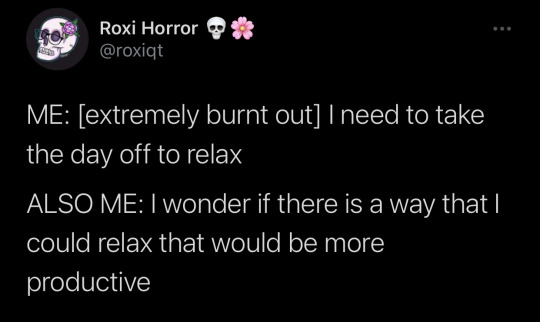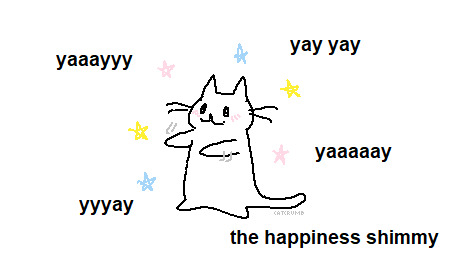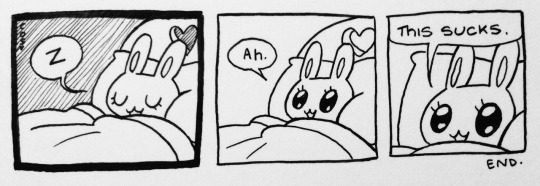Hi! It's Ann! Things I like: Animals, Equality,The Office, Glee (Pre the disaster seasons) Mostly this blog will contain my awful sense of humor or weirdly personal stories. 
Don't wanna be here? Send us removal request.
Text

you can make him transparent, if you want to
96K notes
·
View notes
Text
when hayao miyazaki said that true love was two people inspiring each other to live…recognizing just how hard living is, putting one foot in front of the other every day, how easy it is to lose our passion for it…… that’s the real shit
166K notes
·
View notes
Text
i enjoy video games because they let me live out my wildest fantasies, like being assigned a task and then completing that task
294K notes
·
View notes
Text
in honor of it being the anniversary of original song i’d like to talk about kurts absolute power move that was walking into the warblers rehearsal after it had already started, throwing the door open, not wearing the dalton uniform, deciding that they’re all gonna sing a song about his dead bird, handing someone a cassette just expecting that everyone’s gonna go along with this and making the lead singer fall in love with him in the process
283 notes
·
View notes
Text
“When I was 26, I went to Indonesia and the Philippines to do research for my first book, No Logo. I had a simple goal: to meet the workers making the clothes and electronics that my friends and I purchased. And I did. I spent evenings on concrete floors in squalid dorm rooms where teenage girls—sweet and giggly—spent their scarce nonworking hours. Eight or even 10 to a room. They told me stories about not being able to leave their machines to pee. About bosses who hit. About not having enough money to buy dried fish to go with their rice.
They knew they were being badly exploited—that the garments they were making were being sold for more than they would make in a month. One 17-year-old said to me: “We make computers, but we don’t know how to use them.”
So one thing I found slightly jarring was that some of these same workers wore clothing festooned with knockoff trademarks of the very multinationals that were responsible for these conditions: Disney characters or Nike check marks. At one point, I asked a local labor organizer about this. Wasn’t it strange—a contradiction?
It took a very long time for him to understand the question. When he finally did, he looked at me like I was nuts. You see, for him and his colleagues, individual consumption wasn’t considered to be in the realm of politics at all. Power rested not in what you did as one person, but what you did as many people, as one part of a large, organized, and focused movement. For him, this meant organizing workers to go on strike for better conditions, and eventually it meant winning the right to unionize. What you ate for lunch or happened to be wearing was of absolutely no concern whatsoever.
This was striking to me, because it was the mirror opposite of my culture back home in Canada. Where I came from, you expressed your political beliefs—firstly and very often lastly—through personal lifestyle choices. By loudly proclaiming your vegetarianism. By shopping fair trade and local and boycotting big, evil brands.
These very different understandings of social change came up again and again a couple of years later, once my book came out. I would give talks about the need for international protections for the right to unionize. About the need to change our global trading system so it didn’t encourage a race to the bottom. And yet at the end of those talks, the first question from the audience was: “What kind of sneakers are OK to buy?” “What brands are ethical?” “Where do you buy your clothes?” “What can I do, as an individual, to change the world?”
Fifteen years after I published No Logo, I still find myself facing very similar questions. These days, I give talks about how the same economic model that superpowered multinationals to seek out cheap labor in Indonesia and China also supercharged global greenhouse-gas emissions. And, invariably, the hand goes up: “Tell me what I can do as an individual.” Or maybe “as a business owner.”
The hard truth is that the answer to the question “What can I, as an individual, do to stop climate change?” is: nothing. You can’t do anything. In fact, the very idea that we—as atomized individuals, even lots of atomized individuals—could play a significant part in stabilizing the planet’s climate system, or changing the global economy, is objectively nuts. We can only meet this tremendous challenge together. As part of a massive and organized global movement.
The irony is that people with relatively little power tend to understand this far better than those with a great deal more power. The workers I met in Indonesia and the Philippines knew all too well that governments and corporations did not value their voice or even their lives as individuals. And because of this, they were driven to act not only together, but to act on a rather large political canvas. To try to change the policies in factories that employ thousands of workers, or in export zones that employ tens of thousands. Or the labor laws in an entire country of millions. Their sense of individual powerlessness pushed them to be politically ambitious, to demand structural changes.
In contrast, here in wealthy countries, we are told how powerful we are as individuals all the time. As consumers. Even individual activists. And the result is that, despite our power and privilege, we often end up acting on canvases that are unnecessarily small—the canvas of our own lifestyle, or maybe our neighborhood or town. Meanwhile, we abandon the structural changes—the policy and legal work— to others.”
- Naomi Klein
187K notes
·
View notes
Text
dont talk to me while my earphones are in, mf im at a concert
17K notes
·
View notes
Text
oh yeah? could a depressed person do THIS? *sends an email*
52K notes
·
View notes
Text
everyone: this was badly written me, a simpleton: idk… i enjoyed it…
69K notes
·
View notes
Text
The only certain thing in my life is my Sunday evening depression. My girl never disappoints!
1K notes
·
View notes
Photo







I’ll tell you what. If you promise not to fight anymore, I promise not to yell at you, except on special occasions.
Lilo & Stitch 2002, dir. Dean DeBlois & Chris Sanders
9K notes
·
View notes




